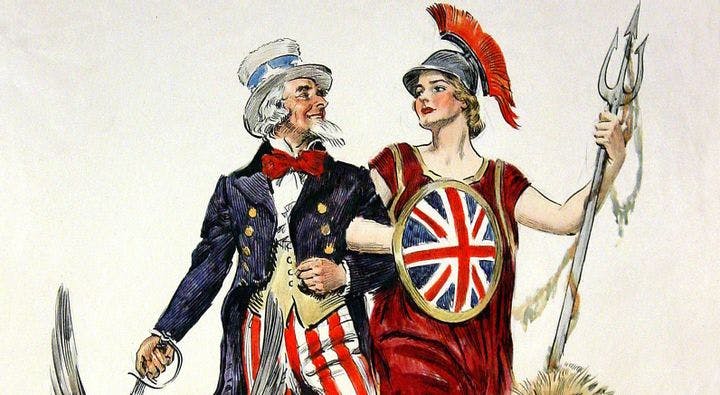Is the UK-US “special relationship” headed for a breakup?
– Marlene Uribe
An "it's not me, it's you" feeling is spreading in the U.K.
The United States cannot afford to lose its proven allies, yet is on the verge of doing so, warn Alan Dobson and Steve Marsh. In Orbis, they write that British popular support for the U.S. is a casualty of America's “benign neglect” of the U.K.
The “special relationship” largely endures, say Dobson & Marsh, due to a reflexive British Atlanticism that is unreciprocated by Americans. Britain is capable and dependable, and its cooperation should no longer be taken for granted. But it is not mere sentimentality that keeps the special Anglo-American relationship afloat: times of crisis cause America to remember that an enduring friendship with Britain is beneficial. Britain offers America support matters relating to capability, diplomacy, and legitimacy.
Why should the world’s largest superpower focus on nurturing its relationship with a mid-sized nation in the North Atlantic? Simply put, the U.S. still needs allies to address global challenges. With its far-reaching influence and shared long-term objectives, Britain fits the 'ally' mold in a way that countries like Russia or Mexico do not or can not. Residual links of empire and Commonwealth remain useful and enable a U.K. with limited resources to forcefully complement American power. Moreover, the U.S. faces the reality that many third parties prefer to work with Britain instead of the U.S., making it all the more important to nourish the relationship.
But do the British want to remain a loyal partner? Britain has remained by Washington’s side in its “Cold War loyal lieutenant role in Iraq and Afghanistan” and yet, has been scantily rewarded, argue Dobson and Marsh. The ill-considered American rhetoric that comes along with the lack of recognition could and has affected British public opinion negatively. Since 9/11, “there have been well-documented frictions,” write Dobson and Marsh, noting British public outrage over Guantanamo, water-boarding, and nuclear deterrence, to name a few of the many hot-button issues.
In spite of these spats, there are three key reasons why the authors feel a continued alliance is likely, at least from the British perspective. The first is Britain’s foreign policy agenda, which dictates that it has global interests to pursue, and that remaining close to Washington while still pursuing ties with Europe and the Commonwealth is favorable. Second, long-time support for the Anglo-American alliance has conditioned the British elite and public to accept this relationship and encourage it. Third, Britain envisions an international order sustained by American leadership (a view shared, incidentally, by the U.S.), which makes it advantageous to be a close friend to Washington.
Dobson and Marsh conclude that the “lifeblood” of the Anglo-American relationship is based on two relationships: One of power and interests, and the other of a sentimental symbolism based on shared values and similar cultures. If America keeps failing to offer Britain privileged cooperation in exchange for their “reflexive Atlanticism,” this could severely damage the relationship.
All noted, however, it’d be a stretch to suggest that anti-Americanism is ascendent in the U.K. A YouGov poll reported that 66% of those surveyed held favorable views of the U.S. However, the same poll showed that 62 percent believed America failed to consider British interests.
Perception is crucial, and Dobson and Marsh recommend that America should allocate some of the billions that it devotes to public diplomacy to countering the impression that it neglects Anglo-American relations. Both the U.S. and Britain will win, as America’s appreciation of Britain will appear to increase, and, with it, London’s ability and willingness to stand alongside the U.S.
If Americans are to trust in Britain like no other nation, the concept of an Anglo-American relationship needs to resonate in the U.S. as much as it does in the U.K.
The Source: “Benign Neglect: America’s Threat to the Anglo American Alliance” by Alan Dobson and Steve Marsh, Orbis, Spring 2014.
